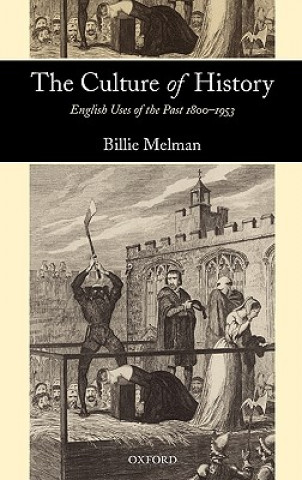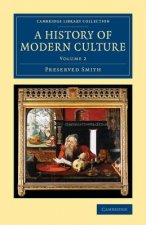
Kód: 04531941
Culture of History
Autor Billie Melman
In this original and widely researched book, Billie Melman explores the culture of history during the age of modernity. Her book is about the production of English pasts, the multiplicity of their representations and the myriad wa ... celý popis
- Jazyk:
 Angličtina
Angličtina - Vazba: Pevná
- Počet stran: 378
Nakladatelství: Oxford University Press, 2006
- Více informací o knize

Mohlo by se vám také líbit
-

Diplomat of the Americas
3121 Kč -

History of Modern Culture
2588 Kč -

Form, Matter and Mixture in Aristotle
1514 Kč
Darujte tuto knihu ještě dnes
- Objednejte knihu a zvolte Zaslat jako dárek.
- Obratem obdržíte darovací poukaz na knihu, který můžete ihned předat obdarovanému.
- Knihu zašleme na adresu obdarovaného, o nic se nestaráte.
Více informací o knize Culture of History
Nákupem získáte 711 bodů
 Anotace knihy
Anotace knihy
In this original and widely researched book, Billie Melman explores the culture of history during the age of modernity. Her book is about the production of English pasts, the multiplicity of their representations and the myriad ways in which the English looked at history (sometimes in the most literal sense of 'looking') and made use of it in a social and material urban world, and in their imagination. Covering the period between the Napoleonic Wars and the Coronation of 1953, Melman recoups the work of antiquarians, historians, novelists and publishers, wax modellers, cartoonists and illustrators, painters, playwrights and actors, reformers and educationalists, film stars and their fans, musicians and composers, opera-fans, and radio listeners. Avoiding a separation between 'high' and 'low' culture, Melman analyses nineteenth-century plebeian culture and twentieth-century mass-culture and their venues - like Madame Tussaud's Chamber of Horrors, panoramas, national monuments like the Tower of London, and films - as well as studying forms of 'minority' art - notably opera.She demonstrates how history was produced and how it circulated from texts, visual images, and sounds, to people and places and back to a variety of texts and images. While paying attention to individuals' making-do with culture, Melman considers constrictions of class, gender, the state, and the market-place on the consumption of history. Focusing on two privileged pasts, the Tudor monarchy and the French Revolution, the latter seen as an English event and as the framework for narrating and comprehending history, Melman shows that during the nineteenth century, the most popular, longest-enduring, and most highly commercialized images of the past represented it not as cosy and secure, but rather as dangerous, disorderly, and violent. The past was also imagined as an urban place, rather than as rural. In Melman's account, City not green Country, is the centre of a popular version of the past whose central Images are the dungeon, the gallows, and the guillotine.
 Parametry knihy
Parametry knihy
Zařazení knihy Knihy v angličtině Humanities History Regional & national history
7109 Kč
- Plný název: Culture of History
- Podnázev: English Uses of the Past 1800-1953
- Autor: Billie Melman
- Jazyk:
 Angličtina
Angličtina - Vazba: Pevná
- Počet stran: 378
- EAN: 9780199296880
- ISBN: 019929688X
- ID: 04531941
- Nakladatelství: Oxford University Press
- Hmotnost: 771 g
- Rozměry: 242 × 163 × 25 mm
- Datum vydání: 22. June 2006
Oblíbené z jiného soudku
-

Hundred Years' War on Palestine
338 Kč -

Ethnic Cleansing of Palestine
357 Kč -

History of Japan
405 Kč -

Ten Myths About Israel
336 Kč -

Strange Death of Europe
410 Kč -

Decline and Fall of the Roman Empire
195 Kč -

Secret History
303 Kč -

God's Playground A History of Poland
1700 Kč -

Mayflower
385 Kč -

How to be a Victorian
357 Kč -

Plantagenets
331 Kč -

General's Son
429 Kč -

Iran: A Very Short Introduction
225 Kč -

Temples of Karnak
3798 Kč -

Cuneiform
276 Kč -

Twenty Years A-Growing
250 Kč -

History of Witchcraft in England from 1558 to 1718
453 Kč -

China in Africa
894 Kč -

Islandman
250 Kč -

Bohemian Paris
414 Kč -

Alexiad
423 Kč -

Lancaster And York
388 Kč -

Modern France: A Very Short Introduction
233 Kč -

Inside Hitler's Greece
519 Kč -

Diana: Her True Story - In Her Own Words
306 Kč -

The Fourth Turning
433 Kč -

The Oxford History of Ancient Egypt
384 Kč -

Churchill: The Power of Words
410 Kč -

Palestine
534 Kč -

Korean History in Maps
706 Kč -

Great Gatsby (Wisehouse Classics Edition)
405 Kč -

Viking Way
1144 Kč -

The Thirteenth Tribe
308 Kč -

My Promised Land
517 Kč -

Vanished Kingdoms
514 Kč -

Age Of Revolution
410 Kč -

Life and Death of Anne Boleyn
624 Kč -

Coming of the Third Reich
464 Kč -

Children of Ash and Elm
462 Kč -

Europe Between the Oceans
798 Kč -

Socialism Betrayed
475 Kč -

303 Squadron
464 Kč -

Ancient Celts, Second Edition
624 Kč -

Dancing in the Glory of Monsters
395 Kč -

Battle of Britain: Luftwaffe Blitz (Images of War)
606 Kč -

Age of Confucian Rule
851 Kč -

Beyond Band of Brothers
410 Kč -

Benjamin Franklin
410 Kč -

On China
462 Kč
Osobní odběr Praha, Brno a 12903 dalších
Copyright ©2008-24 nejlevnejsi-knihy.cz Všechna práva vyhrazenaSoukromíCookies



 Vrácení do měsíce
Vrácení do měsíce 571 999 099 (8-15.30h)
571 999 099 (8-15.30h)